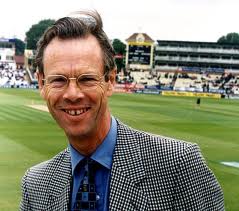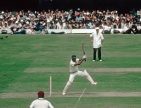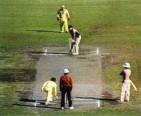CMJ: A Belated Appreciation
Gareth Bland |
“Now what a triumph for him it would be if he could still be batting at six-o’clock this evening“. With those words the late Christopher Martin-Jenkins, who died from cancer on New Years Day at the age of 67, presaged perhaps the most fabled passage of play in post-war English cricket. When Ian Botham walked out to bat at 3:06pm on Monday, 20th July 1981, CMJ was poised behind the microphone. His plummy tones and clipped diction guided the viewer through those series-changing events on the fourth afternoon. CMJ had been drafted into the Beeb’s television team due to the absence of Jim Laker, the Yorkshireman convalescing following an operation. He could not have wished to stand in for a more epoch-making contest. Nor, indeed, could the redoubtable Laker have wished for a more able deputy to sit behind the microphone in his absence.
CMJ’s passing brings with it the usual jockeying for position for those who will bemoan the state of broadcasting and, by extension, the state of the nation. For the reasons behind that we must look at the rise of the man himself and the passing of not only a much loved cricketing institution in the Peterborough born sage, but of quite possibly the last in the line of a particular caste of cricket commentator.His background seems the archetypal one for a man who would devote himself to the coverage of the game of empire. His father, Dennis, the chief executive of a shipping company and his mother, Rosemary, a surgeon, provided the solid base of family virtues from which CMJ would spring. After an early school education at St Bede’s prep school in Eastbourne followed by Marlborough college, he moved on to Cambridge University where he read history. He successfully won two half-blues for rubgy as well as playing cricket, although failing to obtain the blue in the game that was his first love. It was also as an undergraduate that he met his wife, Judy Hayman, the two going on to marry in 1970.
CMJ’s career as one of the game’s commentariat took off after he was appointed deputy editor of The Cricketer while still a student. The editor who appointed him, EW Swanton, had by this time opted to place great faith in his young protege and so the production of the magazine fell largely under Martin-Jenkins’ remit. CMJ left the magazine in 1970 to join the BBC Radio Sports News department. Famously, he refused to be announced under the abbreviated “Chris Jenkins”, insisting instead on his full moniker. From there he joined the Test Match Special team in 1972 and remained a stalwart of the line-up for the next 38 years. His love of the game is also reflected in the fact that he reported on it from plum posts in the written media, too. In 1991 he became cricket correspondent of The Daily Telegraph where he remained until 1999 after which he became chief cricket correspondent at The Times. The illness that finally claimed him came at the beginning of 2012 after the conclusion of the England and Pakistan series in the UAE. His death, coming as it did during the Christmas period which had also claimed former England captain, Tony Greig, was a jolt to those who had been raised on a certain commentary style and highlights what many fear to be generational trends and editorial preferences within the BBC.
With CMJ’s passing the game has lost as a commentator yet another gifted amateur. After John Arlott and Brian Johnson, their ranks have been depleted yet still further by the death of the charming enthusiast, Christopher Martin-Jenkins. Only Henry Blofeld remains, himself now in his seventy-fourth year. The fear, as Peter Oborne outlined in his own tribute to CMJ in The Daily Telegraph is that the BBC is bent on the abolition of the amateur creed and with it the replacement by the dreaded “specialist”, coming as it so often does in the platitudes of the ex-player. Sky Sports, itself the home of the ex-pro, has seemingly led the way. While Atherton, David Lloyd, Gower, Holding and Willis have all at times been insightful, the alternative point of view – that of the gifted, lucid enthusiast from outside the inner circle – is seldom heard. In its worst incarnation the plodding views of the former player tell us nothing that we cannot already see or deduce for ourselves; their insight based on a professional life out in the field coloured by little else. Worse still is the assumption that the bigger the personality, the more engaging, more insightful the ex-pro’s analysis. Simon Barnes’ summation of Ian Botham’s commentary style as “obvious, oafish and banal” is more often than not the most apt for this particular philosophy of commentary.
As Oborne lamented, the young CMJ may have been pushed to gain a foothold at the BBC in the current climate. He argued:
“CMJ would never have had a chance of breaking through today as a cricket commentator in the 21st century BBC sports department. He stood for everything the corporation’s middle management hates most: his elegant diction, eccentricity, deep religious belief, perfect courtesy, public school education, refusal to sensationalise, dislike of modernity, sense of right and wrong, above all his quiet conservatism. It was a miracle that he got in to the BBC 40 years ago”
Maybe the fact that CMJ did, after all, “get in”, is testament to cricket’s special place in the nation’s heart. Maybe, after all, the game being as it is, it is still fire-proof from the worst banalities of the 24 hour media age. A game watched, followed and mused upon by armies of eccentrics could perhaps never become homogonised to the degree that many fear. Christopher Martin-Jenkins was that eccentric enthusiast who touched not only his listeners and viewers but also those around him, too. As his erstwhile colleague, Mike Selvey, remarked in his Guardian tribute “through his entire working life, the Major (CMJ) championed cricket and cricketers of all abilities. The game has lost perhaps the best friend it ever had”. Both Selvey and Jonathan Agnew extolled the virtues of a man not remotely stuffy, an amiable unpunctual aficionado who simply loved the game.
Christopher Martin-Jenkins will be missed by many, both players and followers. They will miss his observations, his essential kindness, the sheer undaunted enthusiasm which he had never lost since first approaching Brian Johnson for advice as a boy. He will be remembered for all those things as indeed, he will, for among many other passages of commentary, those five days at Leeds in July 1981 when he was both witness and guide to events that changed a generation.





A voice and knowledge of cricket that echoes the smell of cut grass and leather on wood….dearly missed
Comment by Damian price | 12:00am GMT 29 December 2013